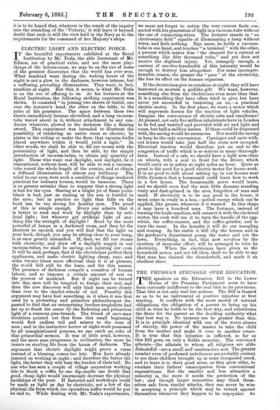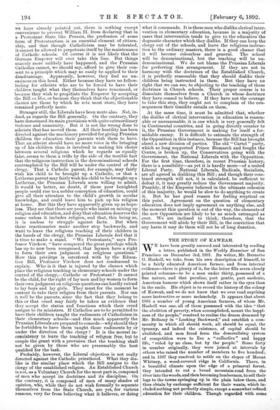THE PRUSSIAN STRUGGLE OVER EDUCATION. T HE speakers on the Education
Bill in the Lower House of the Prussian Parliament seem to have been curiously indifferent to the real blot in its provisions. That blot is not only real but serious. The Bill is framed so as to be an instrument of positive injustice at first starting. It conflicts with the most sacred of natural obligations, the obligation of a parent to bring up his child in. what he holds to be the best way, and substitutes the State for the parent as the deciding authority what that best way is. No tyranny can be greater than this. It is in principle identical with one of the worst abuses of slavery, the power of the master to take the child from the mother and make it over to another owner. It is true that this injustice is inflicted, so far as this Bill goes, on only a feeble minority. The convinced atheists—the atheists to whom all religions are alike distasteful—are a small and unattractive sect. The greater number even of professed unbelievers are probably content to see their children brought up in some recognised creed, and to leave it to their good sense, as they grow older, to emulate their fathers' emancipation from conventional superstitions. But the smaller and less attractive a minority is, the more it needs the protection of the law ; and though larger minorities may think them- selves safe from similar attacks, they can never be wise in accepting a principle which may be turned against themselves whenever they happen to be unpopular. As we have already pointed. out, there is nothing except convenience to prevent William II. from declaring that in a Protestant State like Prussia, the profession of some form of Protestantism is an essential element of citizen- ship, and that though Catholicism may be tolerated, it cannot be allowed to perpetuate itself by the maintenance of. Catholic schools. Of course it is not likely that the German Emperor will ever take this line. But things scarcely more unlikely have happened; and the Prussian Catholics cannot, we should say, afford to give their con- sent to a principle which may so easily be applied to their disadvantage. Apparently, however, they feel no un- easiness on this head. Either because they have no fellow- feeling for atheists who are to be forced. to have their children taught what they themselves have renounced, or because they wish to propitiate the Emperor by accepting the Bill en bloc, or because they think that the objectionable clauses are those by which he sets most store, they have remained perfectly mute.
Stranger still, the Liberals have been mute also. Not, in- deed, as regards the Bill generally. On the contrary, they have denounced its main provisions with quite extraordinary violence and unanimity. But it is not the wrong done to atheists that has moved them. All their hostility has been directed against the machinery provided for giving Prussian children the education their parents wish them to have. That an atheist should have no more voice in the bringing up of his children than is involved in making his choice between several religions which he regards as equally false, seems to them a trifle by the side of the terrible fact that the religious instruction in the denominational schools contemplated by the Bill will be under the control of the clergy. That a Catholic parent, for example, may fairly wish his child to be brought up a Catholic, or that a Lutheran parent may fairly wish his child to be brought up a Lutheran, the Prussian Liberals seem willing to admit. It would. be better, no doubt, if these poor benighted people could rise to a nobler conception of education, could give all their attention to the child's growth in secular knowledge, and could leave him to pick up his religion at home. But this they have apparently given up as hope- less. They see that there are people who insist on mixing up religion and education, and deny that education deserves the name unless it includes religion, and that, this being so, it is useless to struggle against facts. But when these reactionaries make another step backwards, and want to leave the religious teaching of their children in the hands of the clergy, the Prussian Liberals feel that it is time to make a stand. " We Protestants," says Pro- fessor Virchow, " have conquered the great privilege which has up to now been recognised, that laymen have a right to form their own judgment on religious questions." How this privilege is interfered with by the Educa- tion Bill, Professor Virchow does not condescend to explain. Who is it that is injured by the clauses which place the religious teaching in elementary schools under the control of the clergy,—Catholic or Protestant ? It cannot be the child, for the right of lay men and lay women to form their own judgment on religious questions can hardly extend to lay boys and lay girls. They must for the moment be content to take their religion from their parents. Nor can it well be the parents, since the fact that they belong to this or that creed may fairly be taken as evidence that they accept the status and functions which their creed assigns to its ministers. If Catholics are to be permitted to have their children taught the rudiments of Catholicism in their elementary schools—and this much apparently the Prussian Liberals are prepared to concede—why should. they be forbidden to have them taught those rudiments by or under the direction of the clergy ? It is the merest in- consistency to leave the teaching of religion free, but to couple the grant with a provision that the teaching shall not be given by those who are presumably the beat qualified for the task. Probably, however, the Liberal objection is not really directed against the Catholic priesthood. What they dis- like is the similar place which the Bill assigns to the clergy of the established religion. An Established Church is not, as a Voluntary Church for the most part is, composed of men who accept its doctrines and its discipline. On the contrary, it is composed of men of many shades of opinion, who, while they do not wish formally to separate themselves from the State Church, are yet, for various reasons, very far from believing what it believes, or doing what it commands. It is these men who dislike clerical inter- vention in elementary education, because in a majority of cases that intervention tends to give to the education the dogmatic character which they dislike. If they can keep the clergy out of the schools, and leave the religious instruc- tion to the ordinary masters, there is a good. chance that it will become colourless and general. The school will be denominational, but the teaching will be un- denominational. We do not blame the Prussian Liberals for preferring this arrangement. If they are not in harmony with the doctrines of the Established Church, it is perfectly reasonable that they should dislike their children being instructed in them. But they have no right that we can see, to objecting to the teaching of these doctrines in Church schools. Their proper course is to dissociate themselves from a Church in whose doctrines they have ceased to believe. If they have not the courage to take this step, they ought not to complain of the con- sequences their timidity entails on them.
At the same time, it must be admitted that, whether the dislike of clerical intervention in education is reason- able or unreasonable, it is one which is very generally felt in Continental countries, and in going directly counter to it, the Prussian Government is making for itself a for- midable enemy. It is difficult to estimate the strength of the Opposition in this instance, because the Bill has brought about a new division of parties. The old " Cartel " party, which so long supported Prince Bismarck and fought the Centre, is broken up, the Conservatives going with the Government, the National Liberals with the Opposition. For the first time, therefore, in recent Prussian history, there is a possibility—as yet it is hardly more—of a united Liberal Party. National Liberals, Radicals, Socialists, are all agreed in disliking this Bill ; and though their com- bined strength will not, it is calculated, be sufficient to defeat it, it may greatly reduce the Government majority. Possibly, if the Emperor believed in the ultimate cohesion of this majority, he would be slow to do anything to create it. But he has good. reason for feeling sceptical on this point. Agreement on the question of elementary education does not imply agreement on anything else, and the moment this question is out of the way, the elements of the new Opposition are likely to be as much estranged as ever. We are inclined to think, therefore, that the Government will abide by their Bill, in the conviction that any harm it may do them will not be of long duration.







































 Previous page
Previous page